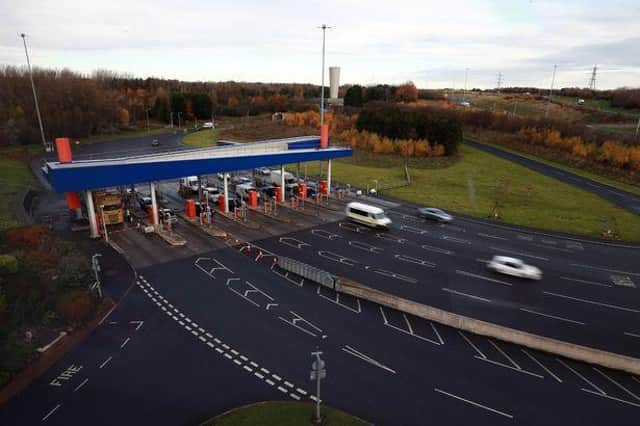Taxpayers funded £7million Tyne Tunnel loan to ensure new barrier-free system goes ahead on time, councils reveal


But it has been revealed tunnel operator TT2 was planning to push back the scheme due to a huge loss of income caused by the Covid-19 pandemic, until local council leaders stepped in with an offer to keep the ‘Tyne Pass’ project on track.
Advertisement
Hide AdAdvertisement
Hide AdThe £6.67million loan was issued from reserves held by the North East Joint Transport Committee (JTC), which is made up of representatives from the area’s seven councils, and was signed off in a behind-closed-doors meeting in September 2020.
A JTC spokesperson said the money came from reserves specifically ring-fenced for the Tyne Tunnel, so it could not be spent on supporting other struggling services, and it will be paid back over the course of TT2’s contract to manage the crossing up to 2037.
Gateshead Council leader Martin Gannon told a meeting of the JTC on Tuesday that the loan arrangement was reached to “secure the long term future” of TT2 after toll revenue dropped substantially at the tunnels during the first Covid lockdown, when traffic levels reduced by up to 70%.
Paul Darby, chief finance officer of the North East Combined Authority (NECA), confirmed that TT2 had suggested delaying its investment in the Tyne Pass scheme in order to cut costs, but that councils wanted to it go ahead due to “a number of benefits from that system being rolled out as planned in terms of carbon emissions”.
Advertisement
Hide AdAdvertisement
Hide AdFrom November, drivers will no longer have to stop to pay at toll plazas on the north side of the tunnel – instead driving straight through, a change which it is hoped will massively cut down on congestion and the resulting air pollution.
Tolls will instead be paid using either pre-paid accounts, a pay-later website, or through PayPoint tills at retailers, with automatic number plate recognition cameras recording vehicles’ journeys.
The ‘open road tolling’ plans have come in for criticism from some tunnel users, who have questioned why a contactless card payment toll booth is not being left in place and how people without access to the internet will pay.
Mr Darby added TT2 has “no danger of going out of business” and the free-flow system will make them “sustainable into the future”, while traffic levels have already increased again to more than 90% of pre-Covid rates.
That is in stark contrast, however, to the perilous financial position of the Tyne and Wear Metro.
There were warnings again on Tuesday that the rail network could face cuts next year, after the Government announced it would end emergency financial support that has covered its pandemic losses next April.
Latest projections estimate that operator Nexus faces a £19million budget shortfall in 2022/23 as a result, £16million relates directly to Metro services.
Coun Gannon said that the options to deal with the deficit were for local councils to commit more of their own money, to secure more government bailout cash, or to cut services – or a combination of the three.
The Labour councillor added that it would be “extremely challenging” for local authorities to find that money in their own coffers, given the level of funding cuts suffered in the last 10 years, and that increasing Metro ticket prices would have the effect of driving passengers away rather than upping income.
The JTC covers transport matters across Newcastle, Northumberland, North and South Tyneside, Gateshead, Sunderland, and County Durham.
Advertisement
Hide AdAdvertisement
Hide AdA TT2 spokesperson said: “In March 2020 TT2’s toll income was significantly impacted by the COVID pandemic and subsequent lockdown, which impacted TT2’s contract payments. No Government relief was provided throughout this period.
“As a result, the planned expenditure for Tyne Pass was affected at the time and TT2 came to an arrangement with the local authorities that enabled Tyne Pass to be delivered as planned. The project will deliver a number of positive benefits for the region including lower carbon emissions, decreased journey times and up to 80 new jobs.
“NECA provided a sum of money that will be paid back at a premium over the coming years, which has enabled the forthcoming modernisation of the tolling system in November. TT2 are thankful for the support from NECA and we look forward to bringing Tyne Pass to customers in November.”